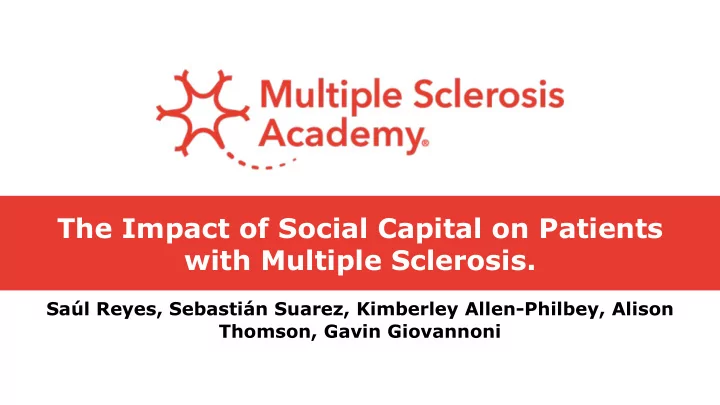

The Impact of Social Capital on Patients with Multiple Sclerosis. Saúl Reyes, Sebastián Suarez, Kimberley Allen-Philbey, Alison Thomson, Gavin Giovannoni
Social Capital • Resources derived from the social interaction between individuals and groups: – Networks. – Organizations. – Social trust within a community. – Norms of reciprocity. Reyes S., Giovannoni G., Thomson A. Social capital: Implications for neurology . Brain Behav 2019;9:e01169.
Social Capital and Health AD Stroke Dhand A et al. Nat Rev Neurol. 2016
Objective • To investigate the effect of SC on the physical and psychological impact of MS.
Methods • A cross-sectional study was conducted among 236 pwMS at The Royal London Hospital, London, UK. • Participants completed an online survey including: MSIS-29, HADS, self-reported EDSS and a SC questionnaire. • The SC questionnaire assessed social networks, trust and norms, personal relationships and civic engagement.
Methods • Kendall's tau correlation test was performed to measure the correlation between SC and MSIS-29. • Multiple linear regressions were conducted to find the best outcome prediction model. • Assumptions were checked for each model: independence of errors, multicollinearity and homoscedasticity.
Results ! n % ! Median IQR ! ! Sex Age (yrs) 43.5 35-52 Female 168 71.2 Disease duration (yrs) 8 4-13 Male 68 28.8 Income decile 5 3-7.8 Type of MS EDSS 4 2.5-6.5 RR 180 76.3 HADS-A 8 4.8-11.3 SP 34 14.4 HADS-D 6 3-9 PP 22 9.3 MSIS-29-PHYS 23.7 8.8-57.5 Race MSIS-29-PSYCH 38.9 16.7-55.6 White 172 72.9 Social capital Asian 27 11.4 Relationships 3 3-4 Black 21 8.9 Social networks 1 1-2 Other/Not stated 16 6.8 Civic engagement 3 2-4 Living arrangements Trust and norms 4 2-5 Family 179 75.8 Total 12 9-14 Friends 11 4.7 ! n % ! Strangers 3 1.3 Marital status Alone 43 18.2 Married 134 56.8 Education Other 102 43.2 College or more 190 80.5 Employment status Secondary school 42 17.8 Employed 140 59.3 Primary school or less 4 1.7 Unemployed 96 40.7
Results Correlation between SC and MSIS-29 MSIS-29-PSYCH MSIS-29-PHYS SC SC
Results ! Adjusted R 2 value Estimate ! Standard Error P Value MSIS-29-PHYS * Total SC -0.09 0.34 0.800 0.78 SC domains 0.77 Relationships -0.92 1.13 0.418 Social Networks 0.22 1.26 0.865 Civic Engagement 0.02 0.73 0.978 Trust and norms 0.12 0.64 0.850 MSIS-29-PSYCH ** Total SC -1.97 0.44 <0.001 0.34 SC domains 0.37 Relationships -6.29 1.41 <0.001 Social Networks 1.13 1.62 0.486 Civic Engagement -0.28 0.98 0.774 Trust and norms -1.66 0.83 0.046 * Adjusted for EDSS, Type of MS, DMT, disease duration, age, ethnicity, HADS-D, income, marital status and living arrangements. ** Adjusted for EDSS, Type of MS, DMT, disease duration, age, education status, income and time in current home.
Conclusions • Higher levels of SC were associated with lower self-rated psychological impact of MS. • Emerging evidence on SC and MS should be translated into interventions for health-promoting purposes.
What's next? SC Interven'on SC Interven*on
The Impact of Social Capital on Patients with Multiple Sclerosis. Saúl Reyes, Sebastián Suarez, Kimberley Allen-Philbey, Alison Thomson, Gavin Giovannoni
Recommend
More recommend